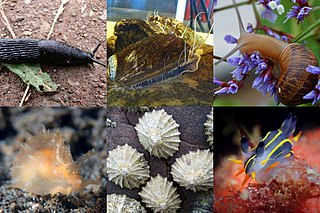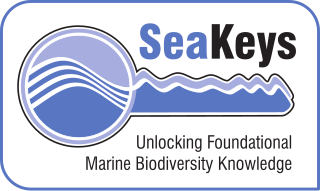
Marine biology is the scientific study of the biology of marine life, organisms in the sea. Given that in biology many phyla, families and genera have some species that live in the sea and others that live on land, marine biology classifies species based on the environment rather than on taxonomy.
Genus is a taxonomic rank used in the biological classification of living and fossil organisms as well as viruses. In the hierarchy of biological classification, genus comes above species and below family. In binomial nomenclature, the genus name forms the first part of the binomial species name for each species within the genus.

The Great Barrier Reef is the world's largest coral reef system, composed of over 2,900 individual reefs and 900 islands stretching for over 2,300 kilometres (1,400 mi) over an area of approximately 344,400 square kilometres (133,000 sq mi). The reef is located in the Coral Sea, off the coast of Queensland, Australia, separated from the coast by a channel 160 kilometres (100 mi) wide in places and over 61 metres (200 ft) deep. The Great Barrier Reef can be seen from outer space and is the world's biggest single structure made by living organisms. This reef structure is composed of and built by billions of tiny organisms, known as coral polyps. It supports a wide diversity of life and was selected as a World Heritage Site in 1981. CNN labelled it one of the Seven Natural Wonders of the World in 1997. Australian World Heritage places included it in its list in 2007. The Queensland National Trust named it a state icon of Queensland in 2006.

Gastropods, commonly known as slugs and snails, belong to a large taxonomic class of invertebrates within the phylum Mollusca called Gastropoda.

Isopoda is an order of crustacean, which includes woodlice and their relatives. Members of this group are called Isopods and include both terrestrial and aquatic species. All have rigid, segmented exoskeletons, two pairs of antennae, seven pairs of jointed limbs on the thorax, and five pairs of branching appendages on the abdomen that are used in respiration. Females brood their young in a pouch under their thorax.

AlgaeBase is a global species database of information on all groups of algae, both marine and freshwater, as well as sea-grass.

The Buccinidae are a very large and diverse taxonomic family of large sea snails, often known as whelks or true whelks.
The World Register of Marine Species (WoRMS) is a taxonomic database that aims to provide an authoritative and comprehensive list of names of marine organisms.

Freshwater snails are gastropod mollusks that live in fresh water. There are many different families. They are found throughout the world in various habitats, ranging from ephemeral pools to the largest lakes, and from small seeps and springs to major rivers. The great majority of freshwater gastropods have a shell, with very few exceptions. Some groups of snails that live in freshwater respire using gills, whereas other groups need to reach the surface to breathe air. In addition, some are amphibious and have both gills and a lung. Most feed on algae, but many are detritivores and some are filter feeders.

A shrimp is a crustacean with an elongated body and a primarily swimming mode of locomotion – typically belonging to the Caridea or Dendrobranchiata of the decapod order, although some crustaceans outside of this order are also referred to as "shrimp".
Lussivolutopsius is a genus of sea snails in the family Buccinidae, the true whelks.
Lussivolutopsius filosus is a species of sea snail, a marine gastropod mollusc in the family Buccinidae, the true whelks.
Lussivolutopsius ivanovi is a species of sea snail, a marine gastropod mollusc in the family Buccinidae, the true whelks.
Lussivolutopsius limatus is a species of sea snail, a marine gastropod mollusc in the family Buccinidae, the true whelks.
Lussivolutopsius marinae is a species of sea snail, a marine gastropod mollusc in the family Buccinidae, the true whelks.
Lussivolutopsius ochotensis is a species of sea snail, a marine gastropod mollusc in the family Buccinidae, the true whelks.
Lussivolutopsius strelzovae is a species of sea snail, a marine gastropod mollusc in the family Buccinidae, the true whelks.

SeaKeys is a large collaborative marine biodiversity project funded through the Foundational Biodiversity Information Program in South Africa. The purpose of the project is to collect and distribute genetic, species and ecosystem information relating to marine biodiversity in southern Africa, which may be used to support informed decision-making about the marine environment.

Heteropsammia is a genus of apozooxanthellate corals that belong to the family Dendrophylliidae.









